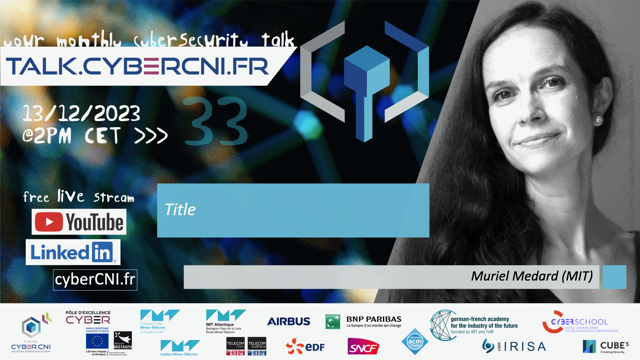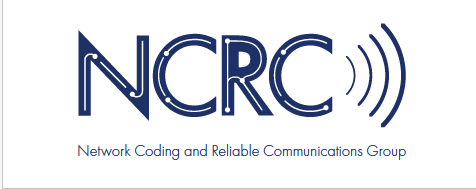On Wednesday, Dec 13th, Professor Médard will be giving a presentation at 8 AM (EST) / 2 PM (CET) for TALK.CYBERcni.fr.’s “Cybersecurity Speaker Series.” This series covers a range of topics in cybersecurity on a monthly basis. These presentations are also given virtually; more details regarding how to attend this series can be found on their website, which is linked here. Similarly, a promotional video can be found here for details from the TALK.CYBERcni.fr youtube.
The title of Prof. Médard’s presentation is “Revisiting Wireless Security.” The abstract is listed below:
“Wireless security has progressed from an area of specialized interest to a matter of discussion in the mainstream press. The attention the issue receives is in great part due to the increased societal reliance on wireless connectivity, be it by the advent of 5G, or by the heavy use of WiFi for remote work in the last couple of years. On the technical side, the confluence of multiple factors has made the topic increasingly complex. First, the heterogeneity of manufacturers and technologies, ranging from traditional mobile systems to WiFi and satellite, render a centrally orchestrated security solution impractical. Second, the introduction of new technologies, particularly at very high frequencies, present new settings in terms of propagation and associate vulnerabilities. Third, traditional wiretap approaches are not robust to recent security analysis based on guessing attacks. Fourth, the erosion of traditional cryptographic schemes, such as RSA, by quantum computing, coupled with the rise of the possibility of such quantum computation, imply that reliance on traditional data hiding is increasingly fraught. Finally, the widespread use of federated learning entails that a highly connected, omnipresent wireless ecosystem also presents new and complex risks in terms of privacy.
In this talk, we argue that the many of the above developments can, when exploited well, be seen not as vulnerabilities but as techniques to enhance security. Heterogeneous settings permit, through network coding, light-weight, in terms of computational and rate overhead, post-quantum secure operation of networks without central coordination. Leveraging these post-quantum schemes, transmissions at high frequencies can be fashioned to obtain absolute security, which does not rely on statistical notions of signal to noise ratios as in conventional wiretap schemes. Guessing random additive noise decoding (GRAND™) provides the ability to incorporate encryption into error-correcting coding directly. Privacy management even in distributed, uncertain settings, can be enhanced by combining machine learning techniques with coding.”




0 Comments